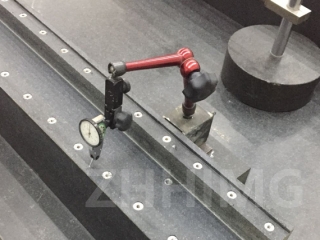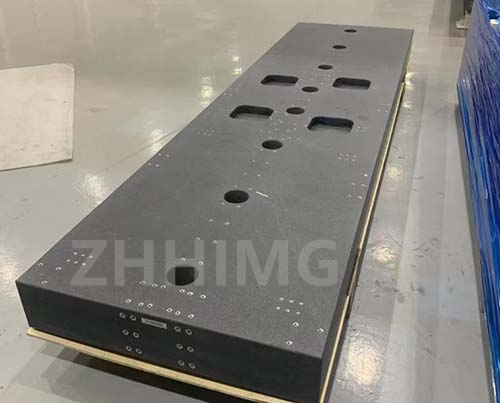In the field of precision mechanical inspection, the accuracy and reliability of lead screw inspection instruments directly affect the quality control of mechanical transmission components. The material selection of the core components of the lead screw detector is the key to determining the service life and performance of the equipment. The special granite component for lead screw inspection instruments, with its outstanding material science advantages, has achieved a breakthrough of extending the service life by 12 years compared to cast iron materials, bringing a revolutionary change to the precision inspection industry.

The limitations of cast iron components
Cast iron has long been a commonly used material for manufacturing components of lead screw testing instruments due to its relatively low cost and certain rigidity. However, cast iron has many shortcomings in practical applications. Firstly, cast iron has poor thermal stability. During the operation of the lead screw detector, the heat generated by the equipment itself and changes in environmental temperature can cause thermal deformation of cast iron components, affecting the accuracy of lead screw detection. As the usage time increases, the cumulative effect of thermal deformation will cause the measurement error to continuously expand. Secondly, the wear resistance of cast iron is limited. During the repeated movement of the lead screw and the inspection operation, the surface of the cast iron component is prone to wear due to friction, resulting in an increase in the fit clearance and thereby reducing the accuracy and reliability of the inspection equipment. In addition, cast iron has relatively weak corrosion resistance. In damp or corrosive gas-containing environments, cast iron components are prone to rust and corrosion, significantly shortening the service life of the equipment.
The material science advantages of granite components
Granite, as an ideal material for the dedicated components of lead screw inspection instruments, has natural physical advantages. Its internal structure is dense and uniform, with an extremely low coefficient of thermal expansion, usually ranging from 5 to 7×10⁻⁶/℃, and is almost unaffected by temperature changes. This enables the lead screw detector to maintain stable dimensions and shapes of granite components even under long-term operation or significant fluctuations in environmental temperature, providing a reliable reference for lead screw detection and ensuring the accuracy of measurement data.
In terms of wear resistance, the Mohs hardness of granite can reach 6-7, which is higher than that of cast iron. During the frequent movement of the lead screw, the surface of the granite component is not easily worn and can always maintain a high-precision fit clearance, ensuring the long-term stability of the lead screw detection. According to the statistics of practical application data, the accuracy decline rate of the lead screw detector using granite components is more than 80% slower than that of cast iron components under the same working conditions.
In terms of corrosion resistance, granite is a natural stone with stable chemical properties and does not react with common acidic or alkaline substances. Even in complex industrial environments, granite components will not be damaged by corrosion, further extending the service life of the lead screw detector.
Remarkable application effects and industry value
The practical application effect of the special granite components for lead screw detectors is very remarkable. Through follow-up investigations of multiple mechanical manufacturing enterprises, it was found that the average service life of lead screw detectors using cast iron components is approximately 8 years, while after adopting granite components, the service life of lead screw detectors can be extended to 20 years, an increase of a full 12 years. This not only significantly reduces the cost for enterprises to replace testing equipment, but also shortens the downtime caused by equipment malfunctions and enhances production efficiency.
From the perspective of industry development, the application of granite components has promoted the advancement of precision detection technology. Its extremely long service life and stable performance provide a reliable guarantee for high-precision lead screw inspection, helping the mechanical manufacturing industry produce higher-quality products and enhancing the competitiveness of the entire industry.
The special granite components for lead screw inspection instruments have successfully overcome the defects of cast iron components by virtue of the advantages of material science, achieving a significant increase in service life. In the future, with the continuous increase in the demand for precision inspection, granite components are bound to play an important role in more fields and provide solid support for the development of the precision manufacturing industry.
Post time: May-12-2025

